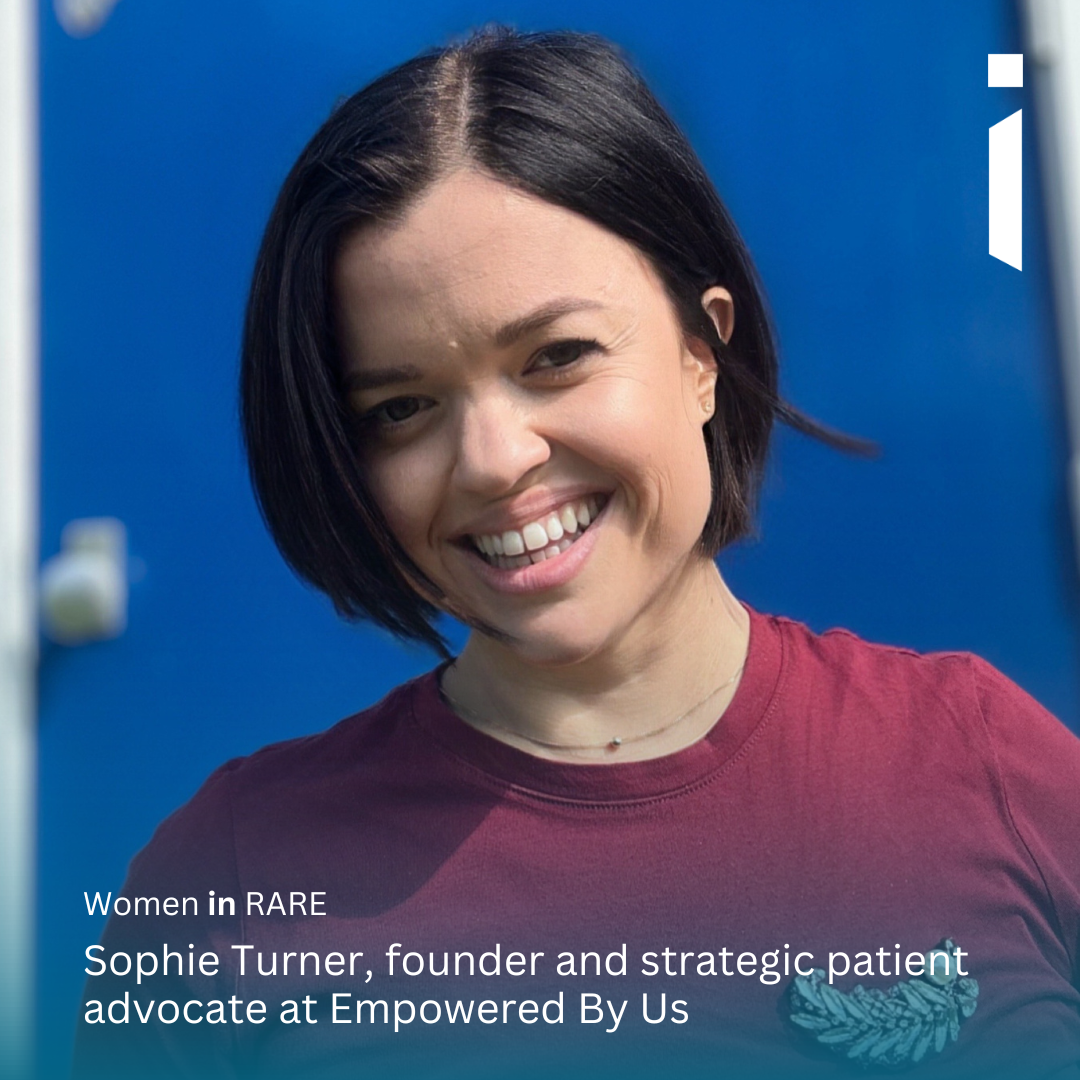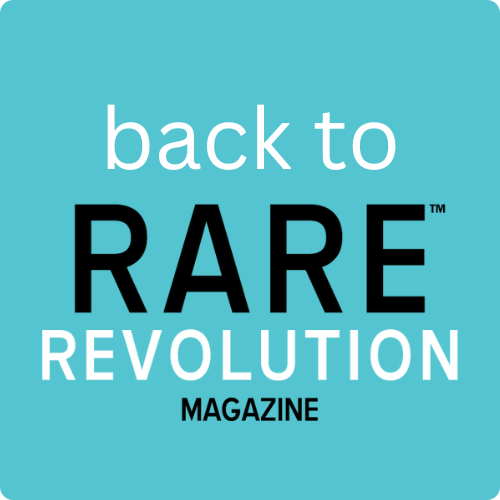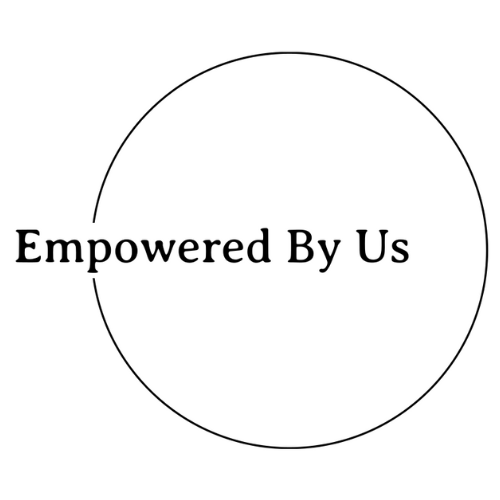Sophie Turner of Empowered By Us
Estimated reading time: 7 minutes

“Over time, I saw how my lived experience gave me an edge in navigating systems, unlocking partnerships, and translating between worlds—patients, policy and industry.”
My career has never followed a conventional path—nor would I want it to. I began in Australia in an entry-level role and was promoted to team manager. Encouraged to aim higher, I applied for a diplomatic position at the Australian Embassy in Washington, DC—a move that changed everything. Working in the US opened my eyes to what true inclusion can unlock: when people are given the chance to lead, they often exceed expectations—even their own.
That experience reshaped my sense of purpose and possibility. After relocating to the Netherlands, I turned my focus to equity, rare diseases and patient advocacy. Today, I lead Empowered By Us, a cross-sector action group amplifying underrepresented voices in rare disease and disability policy across Europe. I also consult independently as a senior strategic advisor. My lived experience with achondroplasia shapes not just what I do, but how I do it—with strategy, urgency, and integrity.
What motivated you into your chosen career path?
I was motivated by what I didn’t see: people like me, with lived experience, shaping the decisions that impact us. Growing up with a rare condition, I knew what it felt like to be spoken about—but rarely spoken with. I also saw how low expectations often shaped people’s perceptions of potential. My motivation is rooted in flipping that dynamic: transforming exclusion into influence. I wanted to become the kind of advocate I once needed—strategic, informed and unafraid to ask uncomfortable questions. I didn’t just want to raise awareness; I wanted to raise standards.
Over time, I saw how my lived experience gave me an edge in navigating systems, unlocking partnerships, and translating between worlds—patients, policy and industry. That’s where I operate now: building coalitions, driving visibility where it matters most and helping others move from ‘included’ to indispensable.
What do you see as some of the opportunities as a woman in your field?
As women in rare disease advocacy, we hold immense potential—not just to represent change, but to shape it. Our field values empathy, insight and collaboration, and women often bring those qualities in abundance. Being a woman with lived experience also opens doors for relational leadership: the kind that earns trust, rather than demands it. In this space, authenticity can be more influential than authority. That creates opportunities to lead differently, build bridges across silos and reframe what power looks like.
The increasing momentum behind strategic patient involvement means more organisations are realising the value of people who can speak both the language of lived experience and the language of systems. Women—especially those from underrepresented backgrounds—are often uniquely positioned to do both. There is also a growing recognition of intersectionality: understanding how different layers of identity affect access and inclusion. That awareness is creating new opportunities to shape policy not just around disease, but around equity.
We’re seeing a shift from tokenism to trust. From “a seat at the table” to co-creating the agenda. That shift creates space for women like me, and for those coming after me, to lead with clarity, boldness and compassion.
But we need to make sure we’re not just invited into spaces; we need to feel entitled to shape them. That mindset shift is part of the opportunity too, and something I aim to model every day.
What are some of the barriers to success as a woman in your field?
Despite progress, women in rare disease advocacy—especially those without formal titles—still face structural and cultural barriers. One of the biggest is visibility. Much of the emotional labour and strategic bridge-building done by women is undervalued because it doesn’t fit neatly into traditional metrics of power or productivity. Advocacy is often seen as passion-driven rather than policy-shaping. That perception needs to change.
Another barrier is compensation. Women—particularly those with lived experience—are frequently asked to share their stories for free, while others are paid to present insights based on our realities. It’s not just unfair; it’s unsustainable. Many women are doing professional-grade work under the banner of “volunteerism,” which limits who gets to participate and who gets to lead.
There’s also the issue of gatekeeping. Networks and funding often remain in the hands of established organisations or legacy voices, and women—especially from non-traditional or minority backgrounds—are expected to prove themselves again and again, even when they’ve already delivered results.
And finally, there’s the internal barrier of self-doubt. When you’ve been socialised to stay grateful for access, it can be hard to advocate for your own value. We need to challenge not just external systems, but the stories we’ve internalised about what we’re “allowed” to ask for.
The solution lies in systemic change—but also in solidarity. When we lift each other up, share credit and amplify unseen labour, we shift the culture from scarcity to strategy and from extraction to equity.
What is one piece of advice you would give your 10-year-old self?
You are not too much. You are not a burden. You are not an exception.
The world just hasn’t caught up to your scale yet. Stop shrinking to fit. Take up space. Ask questions, even when they make people uncomfortable. Your difference is not something to overcome—it’s something to lead with. And when you start seeing your story not as a barrier but as a bridge, you’ll realise your lived experience is your superpower. Hold onto it tightly. It will take you further than you can imagine.
Can you tell us about your current work priorities and focus or a particular project you are working on?
Right now, I’m focused on three interconnected priorities:
1. Policy influence at EU and national levels:
I’m pushing for a European approach to rare disease policy that centres equity, co-creation and strategic patient involvement. This includes collaborating with Members of the European Parliament to align on shared priorities, contributing to national-level discussions in the Netherlands, working with industry partners like Alexion and supporting EURORDIS in its work on the psychological and social dimensions of life with a rare disease. Across these roles, I focus on shaping policies that move beyond access—toward frameworks that reflect the realities of patients’ daily lives and drive long-term, inclusive impact.
2. Building bridges between sectors:
Through Empowered By Us, I help translate lived experience into actionable insight for industry, regulators and institutions. One example is a psychological research paper I’m currently co-authoring, which explores the mental health impacts of public exposure—the experience of being visibly different in public spaces—for people with skeletal dysplasia. By generating data on how social environments affect well-being, we aim to inform more inclusive design, policy and community support.
3. October 2025 event – Policy & Perspectives 2025: Co-Designing Access, Shared Responsibility for Rare Impact
I’m co-hosting this rare disease policy summit focused on strategic patient involvement. The event will spotlight successful cross-sector collaboration and elevate underrepresented voices—not just to speak, but to shape the future of orphan drug access.
Across all this work, I stay rooted in community, especially those living with skeletal dysplasias like myself. For many of us, systemic change isn’t abstract—it’s survival. Every policy brief, roundtable or research project is in service of one goal: a rare disease ecosystem where lived experience is recognised as expertise, and where women like me are not the exception, but the new standard.
Connect with Sophie
Women in RARE is a celebration of women working in the RARE space in science, research, industry and advocacy. To access more Women in RARE articles click below.


